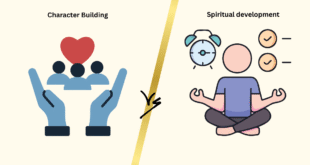A Complete Guide for Modern Muslim Families
Dr. Muhammad Younus Khalid
Parenting is one of the greatest responsibilities and blessings in life. In today’s fast-paced, tech-driven world, parents face countless challenges — from screen addiction and peer pressure to identity crises and moral confusion. Amid these challenges, parents are often left wondering: What is the best way to raise our children?
Two common approaches to parenting stand out: Conventional Parenting and Tarbiyah Parenting. While conventional parenting is widely practiced worldwide, Tarbiyah Parenting is deeply rooted in the principles of Islam and aims to nurture children’s complete development — spiritually, emotionally, mentally, and socially.
In this article, we will explore the key differences between Tarbiyah Parenting and Conventional Parenting, understand why Tarbiyah Parenting is essential for Muslim families, and discover actionable steps to implement it in your home.
What is Conventional Parenting?
Conventional parenting is the mainstream style of raising children, shaped by cultural traditions, societal norms, and modern psychology rather than divine guidance. This approach focuses mainly on providing food, education, and discipline, with the primary goal of preparing children to succeed materially in life.
Example:
Parents ensure their child goes to a good school, gets top grades, and later lands a high-paying job, but they may neglect spiritual growth or character building.
Core Features of Conventional Parenting:
- Material Success Focus: Emphasis on academics, careers, and worldly achievements.
- Discipline Through Control: Often relies on fear-based discipline or punishment.
- Reactive Parenting: Addressing problems after they appear instead of proactively preventing them.
- Neglect of Spirituality: Religion and moral values are often treated as secondary or optional.
- Comparison and Competition: Measuring a child’s worth by comparing them to others.
What is Tarbiyah Parenting?
The Arabic word “Tarbiyah” comes from the root Rabba, meaning to nurture, grow, develop, and guide. In an Islamic context, Tarbiyah is the process of holistic upbringing, ensuring the child grows in faith (Iman), character (Akhlaq), knowledge (Ilm), and skills (Maharat).
Prophet Muhammad ﷺ said:
“Every one of you is a shepherd and every one of you will be asked about his flock.”
(Sahih Bukhari & Muslim)
This Hadith highlights that parenting is a sacred trust. Tarbiyah Parenting aims to raise children as righteous, confident, and successful individuals in both worlds, this life (Dunya) and the Hereafter (Akhirah).
Core Features of Tarbiyah Parenting:
- Spiritual Foundation: Building a deep connection with Allah from an early age.
- Holistic Development: Focusing on spiritual, emotional, intellectual, physical, and social growth.
- Character Building: Nurturing values like honesty, patience, empathy, and gratitude.
- Positive Discipline: Using love, understanding, and guidance instead of fear or control.
- Purpose-Driven Parenting: Raising children to serve Allah and contribute positively to society.
- Future-Oriented: Preparing children for the challenges of modern life while keeping their faith strong.
-
Tarbiyah Parenting vs Conventional Parenting: Key Differences
| Aspect | Conventional Parenting | Tarbiyah Parenting |
| Goal of Parenting | Worldly success: good grades, career, financial stability | Success in both Dunya & Akhirah: righteousness, purpose, and meaningful life |
| Foundation | Culture, trends, personal opinions | Quran, Sunnah, Islamic values |
| Spirituality | Often ignored or secondary | Central to upbringing |
| Discipline Style | Fear, punishment, strict rules | Love, guidance, and understanding |
| Education Focus | Academic excellence only | Knowledge + Character + Skills |
| Identity | Can lead to confusion or weak self-image | Strong Muslim identity rooted in faith |
| Parent-Child Relationship | Authoritarian or distant | Warm, nurturing, and respectful |
| Response to Challenges | Reactive and inconsistent | Proactive and principled |
| Outcome | Child may succeed materially but feel spiritually empty | Balanced, fulfilled, and purpose-driven child |
-
Why Conventional Parenting Often Fails in Today’s World
Many parents following conventional parenting unknowingly set their children up for struggles in the modern era. Here’s why:
-
a) Lack of Strong Identity
Children raised without a clear sense of purpose or faith are easily swayed by peer pressure, social media trends, and harmful ideologies.
Example:
A teen who doesn’t understand their Islamic identity may struggle with self-worth, leading to depression or risky behavior.
-
b) Overemphasis on Grades and Careers
When success is defined only by academic performance, children may feel pressured and disconnected from their true passions and values.
-
c) Poor Emotional Connection
Fear-based parenting creates distance, causing children to hide problems instead of sharing them.
-
d) Inability to Navigate Modern Challenges
Without strong Tarbiyah, kids are ill-prepared to handle:
- Screen addiction
- Pornography exposure
- Gender identity confusion
- Islamophobia and discrimination
-
The Beauty and Power of Tarbiyah Parenting
Tarbiyah Parenting provides the tools and mindset needed to raise confident, resilient, and righteous children in today’s complex world.
-
a) Building a Strong Relationship with Allah
From a young age, children learn that their ultimate purpose is to worship and serve Allah.
This inner connection acts as a moral compass, guiding them even when parents aren’t around.
-
b) Character Development (Akhlaq)
The Prophet ﷺ emphasized character more than mere rituals.
Tarbiyah Parenting nurtures qualities like:
- Honesty (Sidq)
- Gratitude (Shukr)
- Patience (Sabr)
- Respect (Adab)
- Empathy (Rahmah)
-
c) Emotional and Mental Well-being
When children are raised with love and understanding, they develop emotional intelligence, resilience, and healthy coping mechanisms.
-
d) Preparing for Leadership
Tarbiyah Parenting empowers children to become leaders, not followers, ready to face the modern world with strong Islamic values.
Steps to Practice Tarbiyah Parenting in Your Home
Step 1: Strengthen Your Own Faith
You cannot pour from an empty cup. Parents must work on their own connection with Allah before guiding their children.
Step 2: Make Parenting Intentional
Set clear goals for your parenting journey:
- What kind of Muslim do you want your child to become?
- Which values are non-negotiable in your family?
Step 3: Build a Loving Relationship
Children listen to those they feel connected to. Spend quality time, listen actively, and show unconditional love.
Step 4: Teach Through Example
Children copy what they see, not what they are told. Be a role model in prayer, honesty, and kindness.
Step 5: Focus on Holistic Development
Balance their schedule with:
- Spiritual growth: Quran, Salah, Duas
- Intellectual growth: Reading, problem-solving
- Physical health: Sports, healthy eating
- Social skills: Manners, teamwork
Step 6: Use Positive Discipline
Replace shouting and punishment with:
- Clear boundaries
- Logical consequences
- Gentle communication
Step 7: Prepare Them for Modern Challenges
Talk openly about real-world issues like social media, peer pressure, and Islamic identity.
Practical Tarbiyah Parenting Techniques
Here are actionable strategies you can start today:
- Morning Duas Together: Begin the day with Quran recitation and supplications.
- Family Meetings: Discuss weekly goals, challenges, and achievements.
- Storytelling: Share inspiring stories from Seerah and Sahabah lives.
- Screen Time Rules: Set limits and monitor online activity.
- Gratitude Jar: Encourage thankfulness by writing daily blessings.
- Acts of Service: Involve children in charity and community service.
Common Myths About Tarbiyah Parenting
Myth 1: It’s Too Strict
Reality: Tarbiyah Parenting balances love with discipline, focusing on guidance, not control.
Myth 2: It Only Teaches Religion
Reality: It integrates worldly skills, emotional intelligence, and spirituality, creating well-rounded individuals.
Myth 3: It’s Only for Religious Scholars
Reality: Any parent can practice Tarbiyah Parenting by learning basic principles and applying them consistently.
Combining Modern Psychology with Tarbiyah
Modern parenting science offers valuable tools like:
- Positive reinforcement
- Growth mindset
- Emotional coaching
When combined with Quran and Sunnah, these techniques become even more powerful and relevant for Muslim families.
Example:
Teaching mindfulness through Salah and Dhikr enhances emotional regulation and focus.
Benefits of Tarbiyah Parenting
For Children:
- Strong Islamic identity
- Resilience against peer pressure
- Balanced emotional well-being
- Leadership qualities
- Academic and spiritual excellence
For Parents:
- Deeper bond with children
- Clarity and confidence in parenting decisions
- A sense of fulfillment and purpose
For Society:
- Righteous, responsible citizens
- Stronger communities
- Preservation of Islamic values across generations
Real-Life Case Study
Fatima, a mother of three in Texas, struggled with her teenage son’s rebellion.
After learning about Tarbiyah Parenting, she shifted her focus from controlling him to understanding and guiding him.
Through:
- Weekly family halaqas,
- One-on-one bonding time,
- And consistent positive discipline,
Her son not only improved his behavior but also started leading prayers at the local masjid.
This transformation shows the real-life power of Tarbiyah Parenting.
How to Get Started Today
- Join a Parenting Course: Structured programs like the Parenting & Tarbiyah Practitioner Course (PTPC) help parents gain practical skills.
- Read Islamic Parenting Books: Build your knowledge base.
- Connect with a Community: Surround yourself with like-minded families.
- Make Dua: Ask Allah for guidance and patience in your parenting journey.
Final Thoughts: Raising Future Leaders
The stakes are high. The world is filled with distractions and challenges pulling our children away from faith and purpose.
Conventional Parenting may raise children who are materially successful but spiritually empty.
Tarbiyah Parenting, on the other hand, nurtures children to thrive in both worlds.
By consciously choosing Tarbiyah Parenting, you’re not just raising good kids, you’re building the next generation of strong, righteous leaders who will light the way for others.
 Edutarbiyah English Blog of Parenting and Tarbiyah
Edutarbiyah English Blog of Parenting and Tarbiyah




Greetings from Idaho! I’m bored to death at work so I decided to check out your blog on my iphone during lunch break. I enjoy the info you present here and can’t wait to take a look when I get home. I’m surprised at how fast your blog loaded on my cell phone .. I’m not even using WIFI, just 3G .. Anyhow, good site!